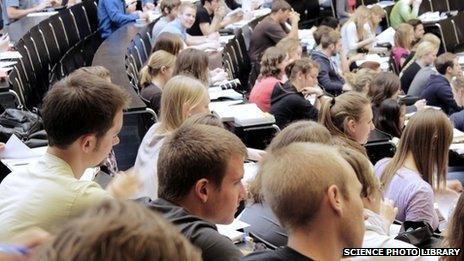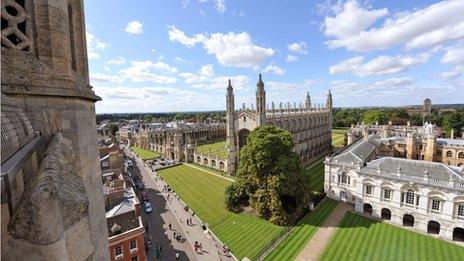Terror plans 'threaten academic freedom'
- Published

Universities pride themselves on being arenas for free speech
Universities should be removed from a list of institutions required by planned terror laws to crack down on extremism, MPs have said.
The Joint Committee on Human Rights said plans to require universities to stop people being drawn into terrorism would stifle academic freedom.
The committee also said the government plans were full of legal uncertainties.
UK universities said there needed to be a suitable balance between freedom of expression and preventing terrorism.
The measures are outlined in the government's Counter Terrorism and Security Bill, which is due for its second reading in the House of Lords on Tuesday, 13 January.
'Restricted'
They were unveiled against a backdrop of rising fears over potential extremist attacks in the UK.
Dr Hywel Francis MP, the chairman of the committee, said: "This balance between liberties and security is a difficult one to strike, but the government's attempt in this bill to place a duty upon universities... has not been well thought-through.
"It might result in academic freedom and freedom of speech, which we know are both key to the functioning of a democratic society, being restricted.
"As open and rigorous debate about ideas is itself one of the most powerful tools in the struggle against terrorism and the extremism which often breeds terrorism, this is surely counter-productive."
The committee said: "Lack of legal certainty over the definitions of terms such as 'extremism' referred to in the draft guidance on the use of this power means that universities will not know with sufficient certainty whether they risk being found to be in breach of the new duty and therefore subject to direction by the secretary of state and, ultimately, a mandatory court order backed by criminal sanctions for contempt of court.
"As this legal uncertainty will have a seriously inhibiting effect on bona fide academic debate in universities, and on freedom of association, the committee recommends that the bill be amended to remove universities from the list of specified authorities to which the new duty applies."
'Strong partnership'
Prof Michael Gunn, vice-chancellor of Staffordshire University and chairman of the Million+ group representing new universities, said of the plans: "If not reconsidered, this may have a chilling effect on free speech and debate in universities.
"The implications of this bill for universities and the recommendations of the joint committee must now be closely scrutinised in the House of Lords."
Nicola Dandridge, chief executive of Universities UK, said: "Universities take the issue of violent extremism very seriously... and there are strong partnerships with the police and security services.
"Universities UK is involved in the ongoing discussions about the proposed statutory guidance, currently under public consultation.
"Universities already do a significant amount of work in this area, and Universities UK's priority will be to ensure that there is an appropriate and proportionate balance between securing freedom of expression and academic freedom and preventing terrorism."
'Right balance'
Immigration and Security Minister James Brokenshire said: "The Counter-Terrorism and Security Bill represents a considered and targeted response to the very serious and rapidly changing threats we face.
"These important new powers will only be used when it is necessary and proportionate and are subject to stringent safeguards and oversight.
"We believe the bill strikes the right balance in strengthening security whilst protecting civil liberties.
"We will give careful consideration to the committee's report."
The issue of how to handle campus extremism is nothing new to universities and academics.
In 2005, the then Labour government drew up guidelines requiring universities to take part in the fight against extremism.
Lecturers said this would lead to academics being required to "spy" on their students' activities and that this would harm the relationships between staff and undergraduates.
- Published14 November 2013
